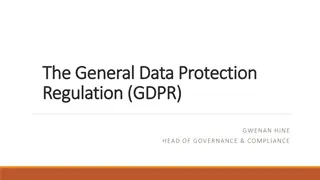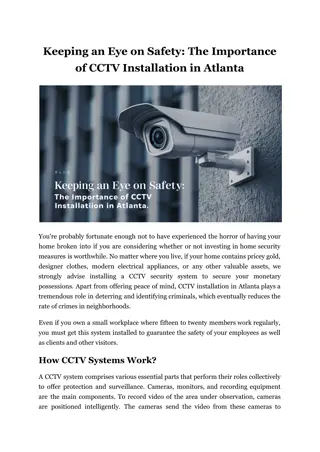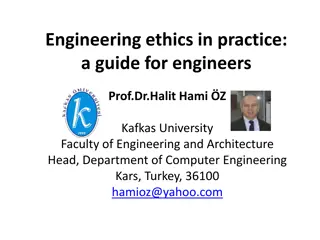Understanding Biometrics, CCTV, and Data Protection
This informative article discusses the importance of data protection in relation to biometric data, CCTV use, and the applicable sections of the Data Protection Act. It covers key aspects such as processing purposes, data accuracy, consent requirements, data security responsibilities, and exemptions from the DPA. Additionally, it addresses the use of biometric fingerprint data for attendance purposes and the guidelines for CCTV use in the workplace.
Download Presentation

Please find below an Image/Link to download the presentation.
The content on the website is provided AS IS for your information and personal use only. It may not be sold, licensed, or shared on other websites without obtaining consent from the author. Download presentation by click this link. If you encounter any issues during the download, it is possible that the publisher has removed the file from their server.
E N D
Presentation Transcript
BIOMETRICS , CCTV & DATA PROTECTION By Drudeisha Madhub Data Protection Commissioner Date: 09.07.14
Biometric Data of a Person All biometric data pertaining to a living individual are personaldata within the DPA. fingerprint, retina, iris, dna, amongst others. The Data Protection Act applies when use or processing of all personal data are being made. They include
Applicability of DPA (relevant sections) Section 22 : Processing for lawful and necessary purpose Section 23 : Accuracy of data has to be ensured Section 24 : The express consent of the data subject is required for processing personal data Section 25: Processing of sensitive data Section 26 : Keeping for specified purpose(s) & ensuring that the data is adequate, relevant and not excessive
Applicability of DPA (relevant sections) Section 27 : The organisation as data controller has the responsibility to ensure that the data is safe and secure Section 28: Data is kept only for a justified duration Section 29: Unlawful disclosure is not allowed Section 32: Data Matching
Exemption from DPA Section 45 : Exemption from DPA application allowed security Section 46 : Exemption to certain sections of the DPA allowed for the prevention or detection of crime by relevant authorities for national
Biometric fingerprint for attendance purposes Requires consent of individuals unless explicitly provided in the contract of employment and the employee is agreeable, or is required by law or relates to information made public by the employee. In case no consent is received, alternative methods for recording attendance must be provided. Appropriate security and organisational measures must be implemented to secure the data and counteract the 3 main risks associated with the use of fingerprints namely identity fraud, purpose diversion and data breach occurrence. Appropriate retention policies must be established e.g what will happen to the data when an employee leaves the organisation?
CCTV at work Images outside the organisation s premises should not be captured. Visible and legible signs should be displayed to inform any individual that an area is being covered by CCTV cameras. Such signs should contain: the purpose/s for which the surveillance is being carried out the identity and contact details of the organisation. Images captured must remain secure at all times.
MNIC THE NATIONAL IDENTITY CARD ACT 2013 Section 12. Collection and processing of data to be subject to Data Protection Act The collection and processing of personal data, including biometric information, under this Act shall be subject to the provisions of the Data Protection Act. However, under sections 24 and 25 of the DPA, consent is not required where the data controller is able to show that the processing is required by law or falls under any other exception applicable under these sections.
Best Practices The Four Part Test Case to case analysis using the following principles to show that collection is required: Necessity Is the measure demonstrably necessary to meet a specific need? Effectiveness Is it likely to be effective in meeting that need? Proportionality Would the loss of privacy be proportionate to the benefit gained? Alternatives Is there a less privacy-invasive way of achieving the same end?
Best Practices - Privacy Impact Assessments A Privacy Impact Assessment is a process intended to help organisations consider the impact that a new or substantially modified initiative can have on people s privacy, especially when personal information is being collected. The process is useful for any organisation. Guideline titled Vol. 6 - Guidelines on Privacy Impact Assessments http://dataprotection.gov.mu on























